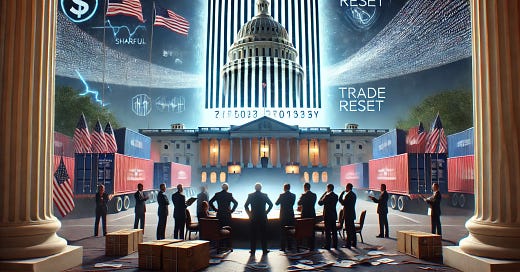Barcode Diplomacy: How Retailers Forced the White House into a Trade Reset
The pivot from “Trade War” to Trade Reset didn’t happen because of some grand strategic rethink. It happened because Trump got cornered by reality—and it spoke with a barcode.
Let’s not sugarcoat it—this was a messaging shift born in the boardroom, not the briefing room. The pivot from “Trade War” to Trade Reset didn’t happen because of some grand strategic rethink. It happened because Trump got cornered by reality—and it spoke with a barcode.
Walmart. Home Depot. Target. They didn’t come to the White House for photo ops. They came bearing spreadsheets and supply chain horror stories. We're talking potential empty shelves by June, spiking consumer prices, and the kind of election-cycle fallout that no polling wizard can spin. That landed. Hard. And just like that, the tone flipped from smash-and-grab tariffs to “we’ll be very nice, and they’ll be very nice.”
This is how the reset begins. Tariffs? They’re no longer the blunt weapon of choice. Now it’s about tiered levies, national security filters, and “gradual” implementation over five years. Translation: the White House is quietly trying to repackage the wreckage into a rules-based system. They're not dropping the hammer—they’re picking up a scalpel.
That’s not de-escalation by accident—it’s a controlled reframe. Call it Trade Reset, call it economic triage, but the White House is clearly trying to massage the optics. They're still talking tough in public, but the private message is: “how do we walk this back without looking weak?”
Even the Powell saga is being de-fanged. Just a week ago, firing the Fed chair was on the table. Now, suddenly, we’re back to independence talk and maybe-I'll-call-him diplomacy. Why? Because this isn’t just about China anymore—it’s about keeping the market from falling out of bed before retail earnings season.
From a trader's seat, it’s crystal clear: tariffs got too big to manage, too fast to reverse. And now the fix is in. We’re not talking capitulation in one clean move—we’re talking controlled unwind disguised as negotiation leverage. China hasn’t even come back to the table, but we’re already seeing the blueprint for tariff moderation, floated just long enough to see if the market bites.
And it did bite. That pop in the S&P wasn’t random. That was the tape reading a shift in posture, a recalibration of intent. The admin knows it too—they're lobbing out trial balloons, tweaking the messaging, seeing what flies. Because at the end of the day, if Main Street retailers are flashing warning lights and Wall Street is wincing at inflation risks, Trade Reset becomes the only politically and economically viable path.
Bottom line? This isn’t a sign of strength—it’s a signal of survival. And markets are picking up the scent.




This is a government by the rich for the rich. I’m more concerned about the centuries of experience we tossed out of government, ordinary people that lost hard earned retirement money, the number of small businesses that will close, and the erosion of our rights.